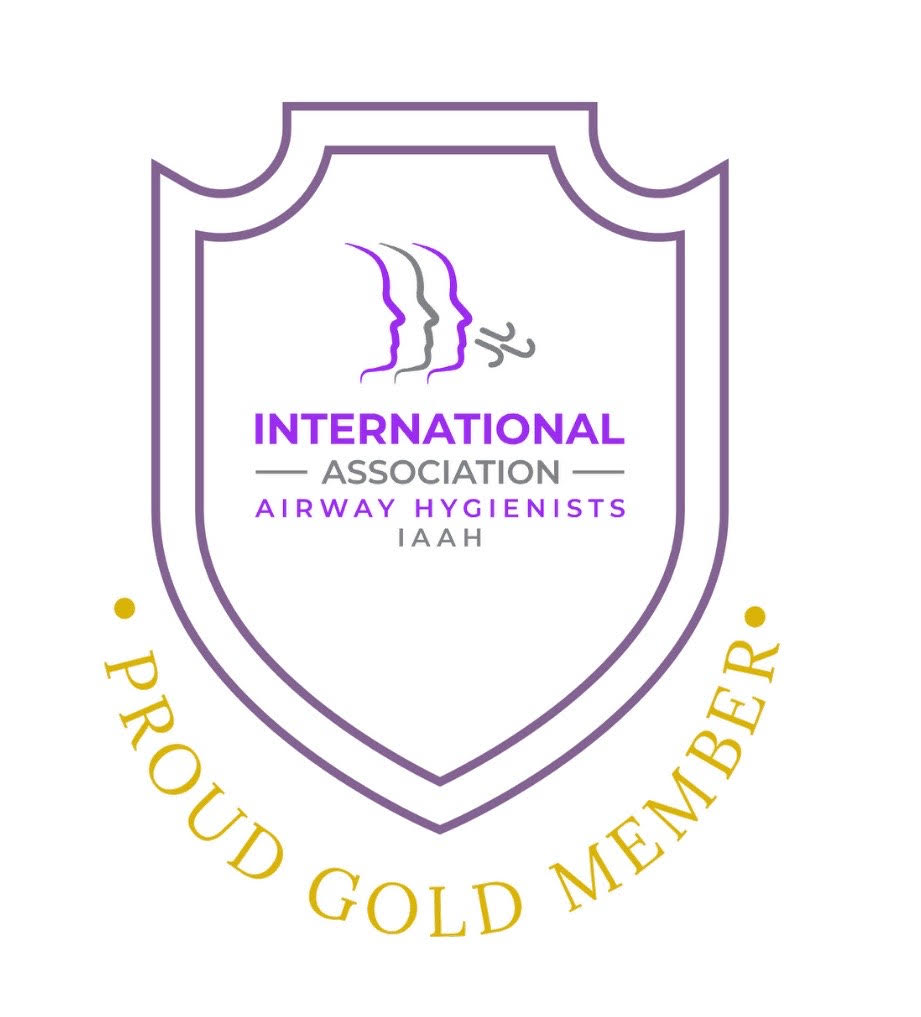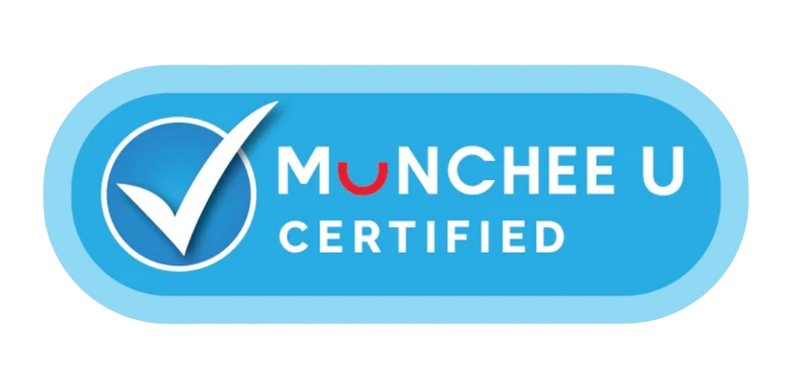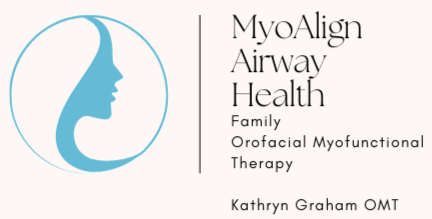MyoAlign Airway Health
How it Works
Struggling with mouth breathing, snoring, jaw pain, or poor sleep? Myofunctional therapy targets the root cause to restore healthy function.
What Is Myofunctional Therapy?
Myofunctional therapy is like physical therapy — but for the muscles of your face, mouth, and neck. It helps retrain these muscles to work the way they were designed to. This type of therapy is ideal for anyone struggling with breathing through their mouth, tongue positioning issues, speech concerns, or difficulties with chewing and swallowing.
The main goals of this therapy are:
- Breathing through your nose day and night
- Keeping your lips sealed when at rest
- Resting your tongue on the roof of your mouth
- Chewing and swallowing properly — without compensations or bad habits
- These may sound simple, but when any of these areas are off balance
- It can lead to serious issues like snoring, sleep apnea, TMJ pain, orthodontic relapse, mouth breathing, and even poor posture
Many common conditions are linked to orofacial myofunctional dysfunction, including:
- Tongue tie
- Tongue thrust
- Low tongue posture / open mouth posture
- Anterior open bite
- Teeth grinding and jaw clenching
- TMJ (jaw) pain
- Snoring and obstructive sleep apnea
- Chronic headaches or neck pain
- GERD (acid reflux)
- Chronic bloating or gas
- Habits such as thumb sucking or nail biting
- Chronic fatigue and waking up tired
- Anxiety
These issues can impact essential functions like breathing, chewing, swallowing, speech, and sleep. Over time, they may also affect mental focus, hormone regulation, growth and development in children, and overall physical health.
How Does It Work?
Through a personalized series of exercises, myofunctional therapy strengthens and retrains the muscles involved in breathing, eating, speaking, and even sleeping. For some patients — especially those with tongue-tie or airway restrictions — therapy may be combined with minor surgical procedures for the best results. But even on its own, therapy is highly effective.
Each exercise plan is custom-designed to target your unique needs and improve your oral function and overall health.
Who is it For?
Myofunctional therapy is suitable for both children and adults. Whether you're seeking relief from chronic mouth breathing, snoring, tongue thrust, or you've been told you need help with tongue posture or facial muscle coordination — therapy can make a significant difference.
Myofunctional therapy is suitable for both children and adults. Whether you've recently noticed symptoms or have struggled with them for years, retraining the oral and facial muscles can restore healthy function and improve quality of life. Therapy sessions are gentle, personalized, and do not involve surgery or medication.
Benefits of Myofunctional Therapy:
- Patients often experience a wide range of improvements, such as:
- Better sleep and improved airway health
- Increased energy, alertness, and focus
- Reduced teeth grinding, clenching, and TMJ discomfort
- Fewer headaches and tension in the neck and jaw
- Decreased snoring and sleep apnea symptoms
- Support for orthodontic treatment and prevention of relapse
- Improved tone and mobility of the tongue and facial muscles
- Enhanced facial balance and symmetry
Myofunctional therapy treats more than just the mouth—it supports whole-body wellness through better breathing, posture, and muscle coordination. Reach out today to learn how it can help you or your child thrive.
MyoFunctional Therapy Treatments
1: Nasal Respiration
When nasal breathing is compromised, the body often defaults to mouth breathing—especially during sleep. This can result from allergies, enlarged tonsils or adenoids, chronic congestion, or poor muscle tone around the lips and face. Mouth breathing disrupts natural breathing patterns and may contribute to snoring, sleep apnea, dry mouth, bad breath, fatigue, poor concentration, and even altered facial development in children. Over time, it can affect oxygen levels and place additional stress on the body, particularly during sleep.
Myofunctional therapy supports the return to nasal breathing by strengthening the muscles that keep the lips sealed and encouraging proper tongue posture that helps maintain an open airway. Through targeted exercises, patients can improve their ability to breathe comfortably through the nose both during the day and at night. Benefits may include deeper, more restful sleep, improved focus and energy, reduced snoring or apnea symptoms, and enhanced growth and facial development in children.
2: Tongue Positioning
A low or forward tongue posture can interfere with essential functions like breathing, swallowing, and speech. When the tongue rests against the floor of the mouth or pushes forward against the teeth, it can lead to issues such as tongue thrust, anterior open bite, poor jaw development, misaligned teeth, speech difficulties, and even chronic TMJ (jaw joint) pain or tension headaches. These dysfunctions often go unnoticed for years, gradually contributing to long-term problems with oral and overall health.
Myofunctional therapy helps by retraining the tongue to rest in its ideal position—gently suctioned to the roof of the mouth. This change in posture improves oral stability and function, supports better breathing, and can reduce stress on the jaw and facial muscles. Patients often notice relief from clenching, grinding, and tension headaches, as well as improved speech clarity, better orthodontic outcomes, and a more balanced facial appearance.
3: Healthy Lip Closure
When the lips do not rest fully closed, especially at rest or during sleep, it often signals poor muscle tone or a habitual open-mouth posture. This dysfunction is common in individuals with thumb-sucking habits, chronic nasal congestion, or prolonged pacifier use, and can lead to facial muscle imbalances, improper jaw development, dry mouth, and poor dental health. Over time, a lack of lip seal can affect the development of the mid- and lower face, especially in growing children.
Myofunctional therapy focuses on strengthening the muscles around the lips and face to encourage a natural, relaxed lip seal. Exercises are designed to re-establish muscle tone and coordination, which support healthy oral rest posture and nasal breathing. As lip closure improves, patients may notice better facial symmetry, enhanced muscle tone, and reduced reliance on oral habits like thumb sucking or nail biting. Improved lip seal also helps support the function of the tongue and airway.
4: Swallow Pattern
An improper swallow pattern—often referred to as a “tongue thrust”—occurs when the tongue pushes forward or sideways during swallowing rather than moving in a smooth, upward motion against the palate. This pattern can interfere with the alignment of the teeth, contribute to orthodontic relapse, and place strain on the jaw and surrounding muscles. Additionally, it may play a role in digestive issues such as GERD, bloating, and inefficient chewing.
Myofunctional therapy helps correct the swallow pattern by teaching patients how to coordinate the tongue, lips, and jaw for a more efficient and functional swallow. By developing muscle awareness and control, therapy improves the way food and liquids are processed and reduces the harmful forces placed on the teeth and jaw. Benefits include improved digestion, decreased TMJ discomfort, stabilized orthodontic results, and enhanced comfort when eating or speaking.
Why Try Myofunctional Therapy?
Because it can truly change your quality of life. By improving the way you breathe, speak, eat, and sleep, myofunctional therapy helps you get to the root of chronic issues — not just manage symptoms. If you've ever dealt with snoring, fatigue, mouth breathing, orthodontic relapse, or trouble swallowing or speaking, you're likely a great candidate.
Let’s work together to restore proper muscle function and help you feel your best — starting with how you breathe.
Rediscover healthy breathing and balanced muscle function with personalized orofacial myofunctional therapy in the Bay Area. In a calm, supportive environment, we guide you through targeted exercises that retrain the muscles of the face and mouth to improve chewing, swallowing, and breathing patterns. By reducing muscle compensation and enhancing airway health, our therapy helps you achieve lasting relief and long-term wellness—one breath at a time.



Why Choose Us
Your Place of Peace and Relaxation
At our Massage & Spa, we are dedicated to providing an exceptional experience that stands out from the rest. Our highly trained and certified therapists use a blend of traditional and modern techniques to cater to your individual needs.
Expert Therapists
Luxurious Ambiance
Wide Range of Services
Premium Products
Hygiene and Safety

15+
Years in service
700+
Satisfied Customers
30+
Professional Therapist
20+
Types of services
Pricing
Pricing that suits your needs
Swedish
60 minutes: $80
90 minutes: $110
Deep Tissue
60 minutes: $90
90 minutes: $120
Hot Stone
60 minutes: $80
90 minutes: $110
Aromatherapy
60 minutes: $80
90 minutes: $110
Reflexology
60 minutes: $80
90 minutes: $110
Facial Treatment
60 minutes: $80
90 minutes: $110
Body Scrub
60 minutes: $80
90 minutes: $110
Couples Massage
60 minutes: $80
90 minutes: $110
Hot Oil
60 minutes: $80
90 minutes: $110
Shiatsu
60 minutes: $80
90 minutes: $110
Book your appointment now and experience the best massage and spa services you deserve
FAQ's
Frequently Asked Questions
What should I expect during my first visit?
Upon arrival, you'll fill out a brief health questionnaire to help our therapists tailor your treatment. You'll then be guided to a relaxing room where your chosen service will be explained in detail.
Do I need to make a reservation?
Yes, we recommend making a reservation in advance to ensure availability and to allow us to prepare for your specific needs.
What should I wear to my appointment?
Wear comfortable clothing. We provide robes, slippers, and private changing areas. For massages, you can undress to your comfort level; our therapists use draping techniques to ensure your privacy.
Are your products safe for sensitive skin?
Absolutely. We use high-quality, hypoallergenic products. If you have specific allergies or sensitivities, please let us know so we can customize your treatment accordingly.
How early should I arrive for my appointment?
Please arrive at least 15 minutes before your scheduled time to complete any necessary paperwork and start your relaxation journey without rush.









